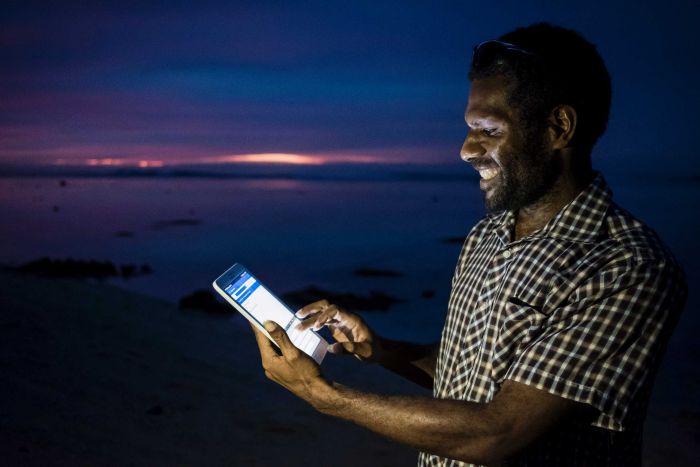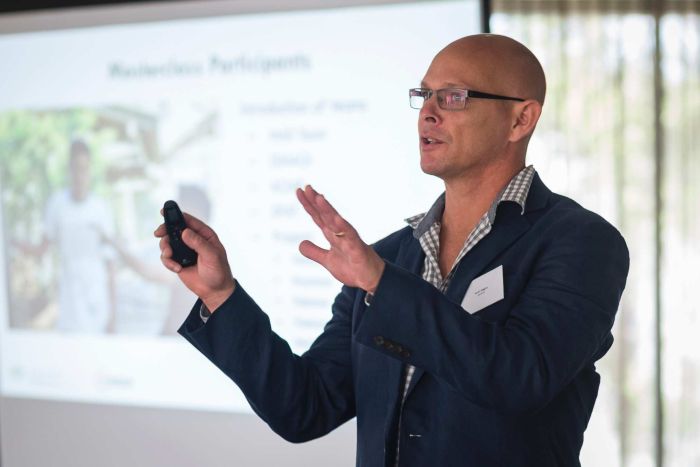 Social researcher Jeromy Kavi uses a tablet to conduct baseline research in Papua New Guinea. (Supplied: Conor Ashleigh/ACIAR)
Social researcher Jeromy Kavi uses a tablet to conduct baseline research in Papua New Guinea. (Supplied: Conor Ashleigh/ACIAR)
Ten years ago cotton farmer Stu Higgins decided to sell his Jandowae, Queensland farm and help other farmers in developing nations.
He was making money but felt unfulfilled and was searching for a new challenge.
Now based in Sydney, he is hoping to bring the latest research and farming information to farmers in developing countries who are often in remote or difficult environments, by using mobile data technology.
"It is all about sharing information, and in this day and age sharing information means sharing data to help them improve as farmers," Mr Higgins said.
"Digital data collection doesn't have to be just data harvesting. It can also be information-sharing in real time back to farmers.
"Too often farmers miss out on the benefit from the research or knowledge that others [have] with their involvement."
Improving profit, production and the environment
"When I first started farming, I was full of enthusiasm but I had limited resources and very limited knowledge," Mr Higgins said.
"I received incredible support from my community. My neighbours taught me so much.
"I'm fortunate now to work with initiatives that do exactly the same thing for neighbouring smallholder farmers overseas."
 Stu Higgins says there is enormous scope to improve food production through data sharing. (Supplied)
Stu Higgins says there is enormous scope to improve food production through data sharing. (Supplied)
Mr Higgins said the call for data sharing — rather than the more traditional one-way data flow — would increase as more farmers around the world freely gave their time and information to others.
"Mobile acquired data [MAD], using apps on tablets to collect data in the field, is helping Australian researchers overseas to collect more meaningful data and adding real value for individual smallholder farmers involved," he said.
"We are helping creative researchers build their own apps using off-the-shelf technology to work with farmers in developing countries, but they're applicable anywhere in the world."
Australian researchers, extension workers, private consultants and companies can also use the data collection technology for research to improve production, the environment, livelihoods and health.
"Many farmers in western countries are concerned that their farm data is collected or stolen by big agricultural companies and used by them to increase profits, but it doesn't have to be that way," Mr Higgins said.
"There is enormous scope to improve food production, increase incomes and improve the environment in many of these developing nations."
MAD projects have been undertaken in Indonesia, Pakistan, Myanmar, Vietnam, Vanuatu and Papua New Guinea, where field conditions are challenging and most of the population is made up of smallholder farmers that underpin food security and economic stability in their countries.
Technology improves relationships
In several projects, farmers get information back in real time, and it is specific to them and their circumstances.
"When feedback from research is delivered to farmers in this way, there's a much greater chance of having an impact," Mr Higgins said.
"We have found the use of technology improves relationships between researchers and smallholder farmers, while facilitating two-way information exchange in near real time, with survey times almost halved and 73 per cent of farmers reporting a positive experience."
One project led by the University of Queensland built an app for work with beef producers in Vanuatu that provided data to farmers on the performance and market price of their cattle for each individual animal in real time.
The app on a tablet is linked to a wireless portable printer in the field, allowing the farmer more information and more bargaining power on when and where to sell cattle.
"It empowers farmers to make better choices based on information fed back to them in near real time," Mr Higgins said.
"The same data can also be used to help countries like Vanuatu to develop a future social and economic policy for its beef industry."
Mr Higgins is director of AgImpact, a company commissioned to deliver the MAD research series for the Australian Centre for International Research.









